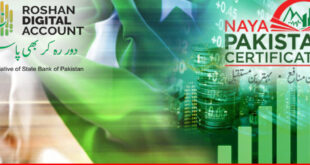With announcement of the budget, it has been widely documented that inflation will be on a rise. We have already witnessed devaluation with the government resorting to the new IMF program. Dollar has crossed Rupees 100 per USD and is expected to further slide reaching Rupees 110 per USD by the close of this year, hence expected to reflect in higher prices across the board. No relief has been provided to the general public who has even stopped protesting against the price hike since these protests never seem to put a dent on the politicians.
Based on international estimates and research analysis’s viewing Pakistan, with IMF debt and further pressure to meet import payments through devaluation, the dollar is expected to reach Rupees 120 per USD by the same time next year if not earlier. Many people have started opening US Dollar accounts which will provide an automatic return of 10 percent through devaluation. In the upcoming Monetary Policy by the end of August 2013, it is expected that SBP will once again chance its stance for Monetary tightening to raise the discount rate and benchmark rate. Lending to private sector including the consumers that had picked up pace will once again witness decline in disbursements. Some banks learning from the past have stopped entertaining new customers for loans to focus once again on the existing portfolio keeping with the view that interest rates will rise bringing new round of NPLs. In such an environment, investment in fixed income will rise; consumer and retail banking will stop whereas excess liquidity of the bank will be directed towards Treasury Bills being a win-win situation for the bank and the government since they need funds to support the deficit which is unlikely to be recovered through taxation as expected. Monetary tightening therefore is the key for the government. Banks on the other hand will curtail new loans to a large extent since taking next to zero risk on Treasuries will yield a healthy return.
In the last few days, I have had an opportunity to speak with a number of businessmen in the industry and how they view the economic situation of the country and decisions the new government has made. Businessmen today are chasing sentiments in the market which are positive. This means we find more and more restaurants, upcoming malls, vehicles and avenues which have make Pakistan a consumer driven market through high demand. The stock market sentiment is positive making KSE the best performing stock market in the world. The sentiment is driven with high hopes from the exiting government with hope to resolve the economic crisis, law and order issues, power and electricity and reduce inflation. Businesses in the FMCG business are thriving whereas textiles, chemicals, consumer durables, oil and gas, cement , refineries, textile spinning and home textiles, shipping and logistics, telecom, IT to name a few, all forecast improvement in business. A major concern is the devaluation, supply side inflation and issues with power and gas. Devaluation is expected to increase the cost of inputs which where businesses will be force to transfer the price hike to the final buyers. Businesses who are dependent on debt must be prepared to an increase finance cost. The electricity crisis is not expected to subside in the next 5 years whereas the devaluation is also expected to continue by more than 10 percent year on year as witnessed since year 2008. The upturn in the economy only seems momentarily until SBP pushes the interest rates on a higher side.
Pakistan today is estimated to have a population of 185 million people, largest city bring Karachi. Pakistan is also ranked the 9th most dangerous country in the world to live in. Almost 1760 people killed in Karachi from January 2013 to June 2013 versus 680 people in Kabul during the same period. Karachi is twice more dangerous than Kabul to live in. The law and order situation is uncontrollable and no one seems to have an answer for this problem. Companies have sprung up in Pakistan specializing in converting vehicles to Bomb and bullet proof keeping with the risk. Security guards are in high demand. Those who can afford and have no option but to live in Karachi tend to invest in their own security. Those finding an opportunity are leaving the country for good. On the flip side, the population of Pakistan being the 6th most populous country in the world is expected to keep the businesses flourishing. The retail and restaurant business is in high demand and more and more investment has been witnessed in this area. Dolmen Mall, Clifton is made as per international standards whereas more are in the pipeline in the near future. Industrial growth despite these economic issues is expected to keep manufacturers satisfied with their business, or at least seems to be the sentiment until June 2014.
As expected, interest rates are expected to rise therefore, those seeking to avail consumer loans whether it be vehicles, consumer loans, home loans should do so to take advantage of reduced rates. Higher interest rates will reduce private sector lending whereas interest rates will keep consumer lending at bay. Businesses once again hoping to capitalize on the opportunity may seek enhancement in limits and negotiate even a finer rate with the bank to counter higher benchmark rate and finance cost. It is expected that businesses will be prudent and will manage their business in a way which does not put any additional burden towards debt repayments going forward. This can partially be achieved through managing production levels in line with expenses which are manageable. At the moment, positivity in thought and hope about Pakistan’s future is keeping people content. Downturn if any, does not take long since the cycle of any economy oscillates with time. Can the current perception be different from reality, only time will tell?
 PAGE Blog Business Weekly Magazine
PAGE Blog Business Weekly Magazine

